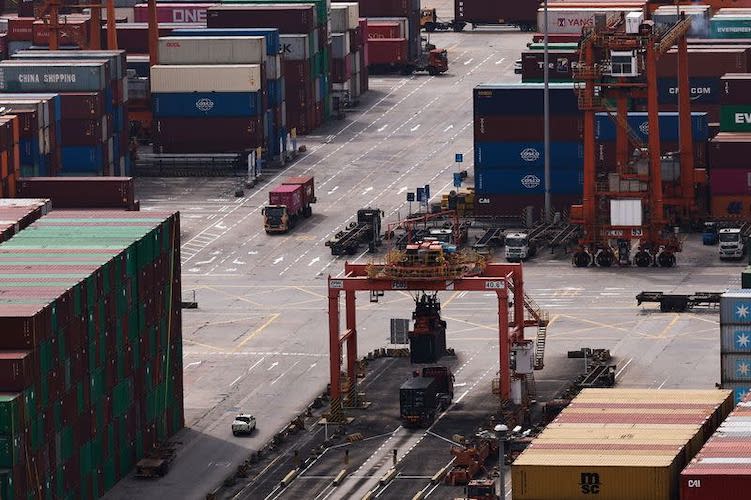China ramped up its rhetoric against US tariffs on Monday, saying it would strike back if countries agree to trade deals with the United States at its expense.
The Commerce Ministry in Beijing said it would firmly oppose any party striking a deal that deters dealings with China and “will take countermeasures in a resolute and reciprocal manner.”
The warning stems from reports that the Trump administration is preparing to pressure nations seeking tariff reductions or exemptions from the US to curb trade with China, including imposing monetary sanctions.
ALSO SEE: EU Rejects US Offer to Cut Tariffs if it Pulls Away From China – IT
News about the alleged US tariff ploy emerged after European officials flew to Washington for trade talks last week.
President Donald Trump paused the sweeping tariffs he announced on dozens of countries on April 2 except those on China, leaving the world’s second largest economy facing the biggest levies.
In a series of moves, Washington has raised tariffs on Chinese imports to 145%, prompting Beijing to slap retaliatory duties of 125% on US goods. Last week, China signalled that its own across-the-board rates would not rise further.
“The United States has abused tariffs on all trading partners under the banner of so-called ‘equivalence’, while also forcing all parties to start so-called ‘reciprocal tariffs’ negotiations with them,” the ministry spokesperson said.
China is determined and capable of safeguarding its own rights and interests, and is willing to strengthen solidarity with all parties, the ministry said.
“The fact is, nobody wants to pick a side,” said Bo Zhengyuan, partner at China-based policy consultancy Plenum.
“If countries have high reliance on China in terms of investment, industrial infrastructure, technology know-how and consumption, I don’t think they’ll be buying into US demands. Many Southeast Asian countries belong to this category.”
Push for UNSC debate on trade ‘bullying’
Pursuing a hardline stance, Beijing will this week convene an informal United Nations Security Council meeting to accuse Washington of bullying and “casting a shadow over the global efforts for peace and development” by weaponizing tariffs.
Earlier this month, US Trade Representative Jamieson Greer said nearly 50 countries have approached him to discuss the steep additional tariffs imposed by President Donald Trump.
Several bilateral talks on tariffs have taken place since, with Japan considering raising soybean, rice and LNG imports as part of its talks with the US, while Indonesia is planning to increase US food and commodities imports and reduce orders from other nations.
Trump’s tariff policies have rattled financial markets as investors fear a severe disruption in world trade could tip the global economy into recession.
On Monday, Chinese stocks inched higher, showing little reaction to the Commerce Ministry comments, though investors have generally remained cautious on Chinese assets due to the rising growth risks.
Chip curbs, port fees
The Trump administration also has been trying to curb Beijing’s progress in developing advanced semiconductor chips which it says could be used for military purposes, and last week imposed port fees on China-built vessels to limit China’s dominance in shipbuilding.
AI chip giant Nvidia said last week it would take $5.5 billion in charges due to the administration’s curbs on AI chip exports.
China’s President Xi Jinping visited three Southeast Asian countries last week in a move to bolster regional ties, calling on trade partners to oppose unilateral bullying.
Beijing has said it is “tearing down walls” and expanding its circle of trading partners amid the trade row.
The stakes are high for Southeast Asian nations caught in the crossfire of the Sino-US tariff war, particularly given the regional ASEAN bloc’s huge two-way trade with both China and the United States.
ASEAN is China’s largest trading partner, with total trade value reaching $234 billion in the first quarter of 2025 and accounting for over 16% of China’s overall foreign trade, China’s customs agency said last week.
Trade between ASEAN and the US totalled around $476.8 billion in 2024, according to US figures, making Washington the regional bloc’s fourth-largest trading partner.
- Reuters with additional input and editing by Jim Pollard
ALSO SEE:
TransPacific Cargo Trade Decimated by Trump’s Tariff War
China Says it Will ‘Shake Hands Not Fists’ to Beat US Tariffs
Trump Wants Defence Costs Part of Tariff Talks With Asian Allies
China Halts Rare Earth Exports, Warns US on Deep-Sea Metals ‘Plan’
Trump Tariffs Could Hit US-Made Drugs in China, Data Shows
China Calls For US to Scrap Its Tariffs as Xi Starts SE Asia Tour
China Lifts Tariff on US Goods to 125%, as ‘Hikes Become a Joke’
Plan For High Port Fees on Chinese Ships Worrying US Exporters
























